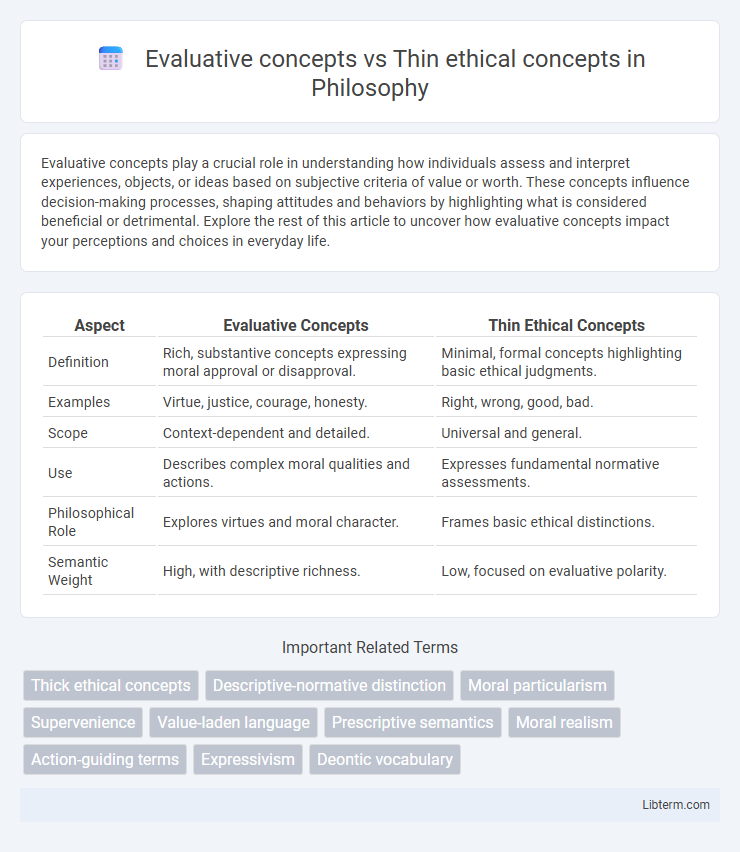Evaluative concepts play a crucial role in understanding how individuals assess and interpret experiences, objects, or ideas based on subjective criteria of value or worth. These concepts influence decision-making processes, shaping attitudes and behaviors by highlighting what is considered beneficial or detrimental. Explore the rest of this article to uncover how evaluative concepts impact your perceptions and choices in everyday life.
Table of Comparison
| Aspect | Evaluative Concepts | Thin Ethical Concepts |
|---|---|---|
| Definition | Rich, substantive concepts expressing moral approval or disapproval. | Minimal, formal concepts highlighting basic ethical judgments. |
| Examples | Virtue, justice, courage, honesty. | Right, wrong, good, bad. |
| Scope | Context-dependent and detailed. | Universal and general. |
| Use | Describes complex moral qualities and actions. | Expresses fundamental normative assessments. |
| Philosophical Role | Explores virtues and moral character. | Frames basic ethical distinctions. |
| Semantic Weight | High, with descriptive richness. | Low, focused on evaluative polarity. |
Introduction to Evaluative and Thin Ethical Concepts
Evaluative concepts involve broader moral appraisals that express attitudes towards actions, traits, or events, such as justice, kindness, or cruelty. Thin ethical concepts are specialized evaluative terms that convey minimal descriptive content while primarily serving to express approval or disapproval, examples include "good," "bad," "right," and "wrong." Understanding the distinction helps clarify how moral language functions both normatively and descriptively in ethical theory.
Defining Evaluative Concepts in Ethics
Evaluative concepts in ethics denote terms that express approval or disapproval based on moral judgment, such as "good," "right," or "just," which provide a richer evaluative content than thin ethical concepts like "permissible" or "wrong." These evaluative terms engage with substantive moral values and principles, facilitating deeper ethical analysis and normative reasoning. Defining evaluative concepts involves identifying their role in expressing positive or negative appraisals tied to moral standards and guiding ethical behavior.
Understanding Thin Ethical Concepts
Thin ethical concepts such as "good" and "bad" express basic evaluative judgments with minimal descriptive content, enabling straightforward moral assessments. These concepts function as foundational tools in ethical discourse, providing immediate evaluative guidance without complex justification or context. Understanding thin ethical concepts involves recognizing their role in shaping intuitive moral reactions while serving as building blocks for more detailed ethical analysis.
Key Differences Between Evaluative and Thin Ethical Concepts
Evaluative concepts encompass a broad range of value judgments including beauty, skill, and pleasure, while thin ethical concepts specifically address moral evaluations such as right, wrong, good, and bad. Thin ethical concepts are characterized by their inherent normative force and direct moral implications, whereas evaluative concepts may lack this imperative quality and can be more descriptive. Understanding these distinctions clarifies how moral language functions differently from general value assessments in ethical theory.
Historical Perspectives on Ethical Concepts
Evaluative concepts such as justice, virtue, and honesty have evolved through centuries of philosophical discourse, reflecting complex moral judgments rooted in cultural and historical contexts. Thin ethical concepts, including right, wrong, good, and bad, serve as foundational elements in ethical reasoning, offering more generalized and less descriptive moral assessments. Historically, the distinction between these concepts has shaped ethical theory by influencing how moral language expresses both broad evaluative values and specific normative directives across different eras and traditions.
Philosophical Theories on Evaluative vs Thin Concepts
Philosophical theories distinguish evaluative concepts, which express rich normative content such as "good" or "just," from thin ethical concepts like "wrong" or "bad" that convey minimal evaluative content. Evaluative concepts underpin moral reasoning by integrating robust justificatory elements, whereas thin ethical concepts primarily serve expressive or emotive functions without extensive justificatory weight. This distinction plays a crucial role in metaethics, influencing debates between cognitivist and non-cognitivist accounts of moral language and judgment.
Roles in Moral Reasoning and Discourse
Evaluative concepts such as justice and virtue provide rich, substantive content that guides moral reasoning by influencing judgments and promoting critical reflection on ethical principles. Thin ethical concepts like right, wrong, good, and bad serve primarily as foundational linguistic tools essential for expressing moral approval or disapproval in discourse. The interplay between these concepts facilitates nuanced ethical analysis by allowing complex moral evaluations to be grounded in basic normative criteria, enabling clearer communication and justification in moral debates.
Common Examples of Evaluative and Thin Ethical Concepts
Evaluative concepts such as "bravery," "intelligence," and "creativity" express positive or negative assessments of actions or qualities without inherently implying moral judgment. Thin ethical concepts like "good," "bad," "right," and "wrong" combine evaluative content with explicit moral significance, guiding ethical reasoning and decisions. Common examples include labeling a kind act as "good" (thin ethical) versus describing a puzzle solver as "intelligent" (evaluative), highlighting the distinction between moral and non-moral assessments.
Challenges in Distinguishing Ethical Concepts
Distinguishing evaluative concepts from thin ethical concepts poses significant challenges due to their overlapping normative features and context-dependent interpretations. Thin ethical concepts such as "right," "wrong," "good," and "bad" often serve as fundamental evaluative terms that lack the descriptive specificity found in thicker ethical concepts, complicating precise categorization. Semantic ambiguity and the fluid boundaries between factual and moral judgments further hinder clear differentiation, impacting ethical analysis and moral philosophy discourse.
Contemporary Debates and Future Directions
Evaluative concepts involve broad moral judgments such as justice and virtue, while thin ethical concepts are simpler terms like good and bad that express fundamental approval or disapproval. Contemporary debates focus on how thin and thick concepts interact in moral reasoning, questioning whether thin concepts can fully capture complex ethical nuances or if thick concepts are indispensable for concrete moral evaluations. Future directions explore integrating these concepts through interdisciplinary research combining analytic philosophy, cognitive science, and artificial intelligence to enhance ethical decision-making frameworks.
Evaluative concepts Infographic

 libterm.com
libterm.com